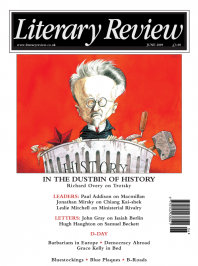Frank McLynn
‘Gracie, Of Course!’
High Society: Grace Kelly and Hollywood
By Donald Spoto
Hutchinson 236pp £18.99
Grace Kelly makes an interesting entry in any encyclopaedia of Hollywood. Born into a family of wealthy Philadelphia Catholics, she went her own way, was a top model at twenty and a movie star shortly afterwards. What makes her interesting as an icon is that she was one of those rare celluloid women (Catherine Deneuve is another) who bridged the divide between beauty and sex appeal. Actresses who are beautiful (Garbo, Audrey Hepburn, etc) tend not to be sexy, and the sexy ones (Angie Dickinson, Inger Stevens, etc) often fall short of real beauty. This partly explains why Grace Kelly was always popular with both men and women. Never much of an actress, she had the good fortune to be a Hollywood ‘pet’ and to work with directors of the calibre of Ford, Hitchcock and Fred Zinnemann. She was Hitchcock’s favourite actress, and he rated her even above Ingrid Bergman – though Ingrid undoubtedly has the edge when it comes to filmography. All three of her Hitchcock films (Spellbound, Notorious and Under Capricorn) are masterpieces but only one of the Kelly movies is (Rear Window). Dial M for Murder and To Catch a Thief are mere ‘entertainments’, to use the Graham Greene term.
There are times in this book, indeed, when Donald Spoto, known as a Hitchcock buff, seems more interested in revisiting the old master than in concentrating on Kelly. Hitchcock’s well-known preference for ice-cool blondes was based on his theory that an icy feminine demeanour concealed a raging furnace

Sign Up to our newsletter
Receive free articles, highlights from the archive, news, details of prizes, and much more.@Lit_Review
Follow Literary Review on Twitter
Twitter Feed
Under its longest-serving editor, Graydon Carter, Vanity Fair was that rare thing – a New York society magazine that published serious journalism.
@PeterPeteryork looks at what Carter got right.
Peter York - Deluxe Editions
Peter York: Deluxe Editions - When the Going Was Good: An Editor’s Adventures During the Last Golden Age of Magazines by Graydon Carter
literaryreview.co.uk
Henry James returned to America in 1904 with three objectives: to see his brother William, to deliver a series of lectures on Balzac, and to gather material for a pair of books about modern America.
Peter Rose follows James out west.
Peter Rose - The Restless Analyst
Peter Rose: The Restless Analyst - Henry James Comes Home: Rediscovering America in the Gilded Age by Peter Brooks...
literaryreview.co.uk
Vladimir Putin served his apprenticeship in the KGB toward the end of the Cold War, a period during which Western societies were infiltrated by so-called 'illegals'.
Piers Brendon examines how the culture of Soviet spycraft shaped his thinking.
Piers Brendon - Tinker, Tailor, Sleeper, Troll
Piers Brendon: Tinker, Tailor, Sleeper, Troll - The Illegals: Russia’s Most Audacious Spies and the Plot to Infiltrate the West by Shaun Walker
literaryreview.co.uk